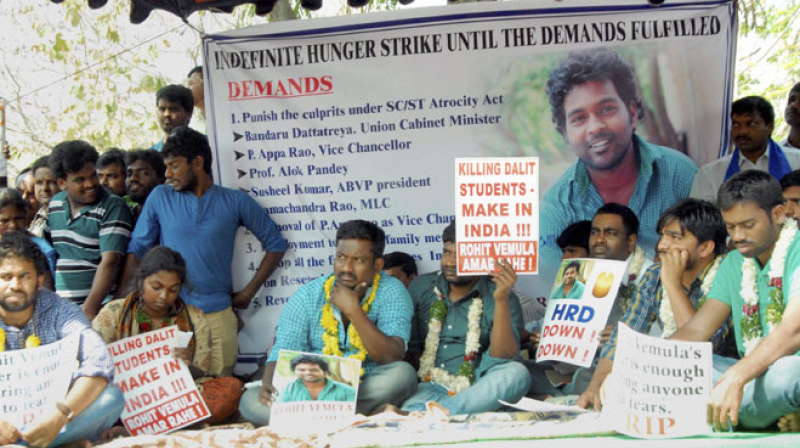A Government Terrified of Students

NEW DELHI: It is perhaps first time in memory that one sees the mighty government of India battling students across University campuses, in a manner that can only be described as reprehensible and ugly. It is also extremely unfortunate that the big media has decided to take sides, in this unequal battle, supporting the worst decisions by the government in its effort to silence the students, still at protest, and take away the right to debate and dissent through the use of brute force.
After failing to silence Jawaharlal Nehru University, the central government decided to move back to the Hyderabad Central University to exert its failing power over the students. The Vice Chancellor -- under whose watch Rohith Vemula committed suicide after a trajectory of humiliation under which he and four other Dalit scholars had been expelled, without food, from the hostels -- was reinstated by the Human Resource Development Ministry. Appa Rao Podile who had gone on indefinite leave after Vemula’s death, was thus rewarded and brought back to the post. As expected the students went on strike, protesting the move.
The police was back in the campus using lathis and violence to quell the protests over two successive days. HCU was turned --- as The CItizen first reported --- into a war zone with water and electricity snapped, internet crippled, food for the students stopped, debit cards sealed. The students became the ‘enemy’ of the government that then uses war like tactics to pressure and threaten them. The media that did want to report was not allowed inside the campus. Over 30 students were arrested, many thrashed and beaten with at least one being admitted into ICU unconscious. The stories coming out of the campus speak of high levels of brutality by the police, under the supervision of the University authorities, the state and central government
The Citizen report was removed from Facebook by Facebook, and restored only after it became clear that the news about the crackdown on the University was not going to be suppressed.
The government has clearly taken a decision, part of it visible in HRD Minister Smriti Irani’s remarks in Parliament, to silence those with an independent mind in a bid to control the Universities. The target seems to have become Dalit students, as was the case in IIT-M and HCU in particular as there is resistance from these groups to an ideology that seeks to bring discrimination under the so called equality tag. In the process, the BJP/RSS that judging from the crackdown on HCU yet again, despite the furore over Vemula’s death earlier, is sharply alienating the student community across the Universities. And the alienation, judging from the response, is not confined to the Dalit students but moving fast to include all students as a community.
This is perhaps the first time since the Emergency, that a students movement is gathering force in this form. And given the bold and courageous speeches by the JNU students arrested, and now released on bail, for sedition the students bodies are infused with new courage and determination. Clearly the BJP/RSS has taken the view that force and violence can subdue this virtual uprising, but given the response of both boys and girls in HCU now, and JNU earlier, clearly this force is not going to quell the protest that is now set to increase with time.
The government is using the Akhil Bharatiya Vidyarthi Parishad as its eyes and ears in University campuses, as well as the mob that is let loose to disrupt meetings on issues that are not seen as kosher by the parent bodies. For instance, meetings in support of JNU students in the campuses are a prime target for attack, with ABVP students being mobilised to disrupt and stop these. In several cases these meetings have moved outside the campuses, for fear of violence, but the anger even in these Universities is growing.
There seems to be a phobia and fear guiding the BJP/RSS into what is emerging a systematic attack on students. The decision not to allow JNUSU president Kanhaiya Kumar to speak to HCU students as scheduled, is indicative of this fear. It is certainly not an act of courage for a government to stop interaction of this kind by students. At the same time, there is this stubborn refusal to acknowledge that the students today have different and differing aspirations, that they are more political and forthright than even the generation before, and that the steady influx of the backwards and Dalits into the higher institutions because of the reservation policy has started leading to a new, and very welcome, assertiveness by those who were made to live in the dark for centuries.
This is a new generation of youth who are preparing to take over the reins of power. And those who feel threatened are those who are using force to quell an assertion that they should realise they can no longer stop.



